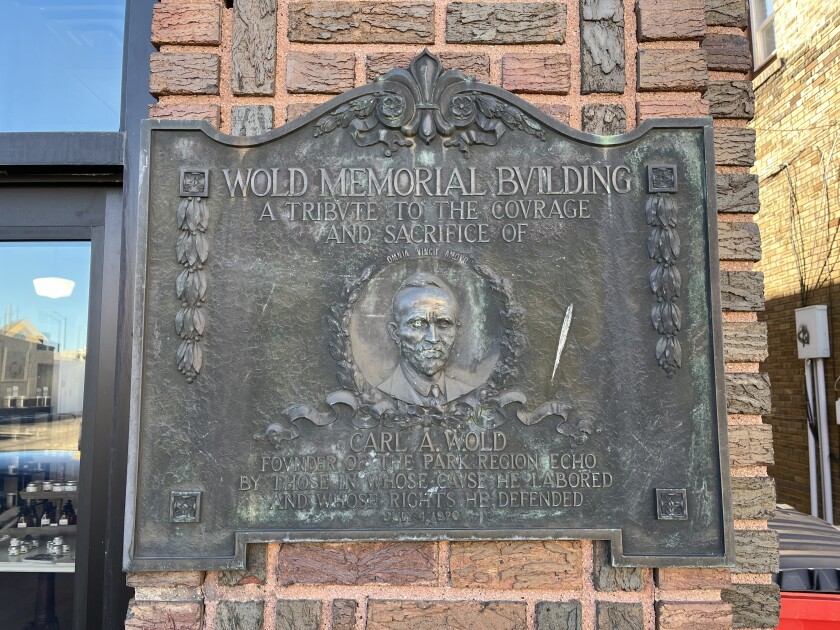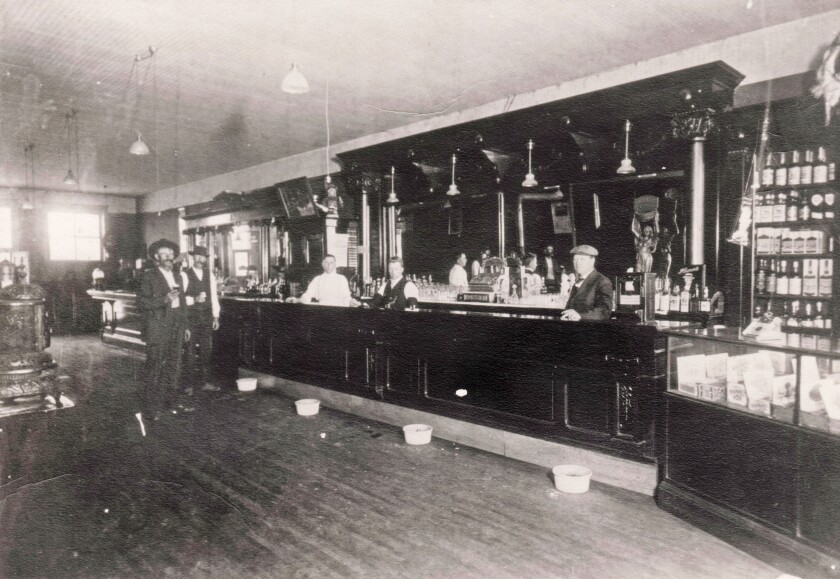"Congress shall make no law respecting an establishment of religion, or prohibiting the free exercise thereof; or abridging the freedom of speech, or of the press; or the right of the people peaceably to assemble, and to petition the Government for a redress of grievances." — The First Amendment of the U.S. Constitution
Carl Wold, editor of the Park Region Echo, had received more than criticism regarding his coverage of the First World War.
ADVERTISEMENT
He was knocked down in the street.
Someone broke into the Echo office and destroyed the paper's linotype machine.
And on Feb. 9, 1918, he and his wife Eva were charged by the state attorney general's office for making seditious and disloyal statements in the paper.
A lifelong resident of Minnesota, Carl Wold was born near Windom on July 4, 1870, the son of Norwegian immigrants. The family moved to Douglas County in 1882.
Following a stint at Minnesota State University, Wold taught school briefly and owned a share of his father's farm.
He went to work with the Brandon Echo in 1905, eventually merging it with a larger paper. The Park Region Echo Company was organized, and the first issue was published at Alexandria in September 1908.
As World War I loomed in the next decade, Wold began to publish editorials denouncing the conflict and those who would have the United States enter into it.
ADVERTISEMENT
After the United States did enter the war in April 1917, Wold's coverage continued. He published articles against the draft and militarism in general.
Then on May 8, 1917, he published an article entitled, "Are We Deceived By Our Rulers?"
In the article, Wold wrote that the reasons behind the war were not to overthrow German militarism, as had been claimed, but were more along the lines of the common people versus the plutocracy (i.e., the wealthy).
"A large number claim this is all there is to this war," Wold wrote. "As proof they show that the large number of the common people thruout the world has been opposed to this war and that the plutocracy has been in favor of it — not only in the United States but in all nations of the world."
Wold went on to write that "friends of the common people" maintain that "the entry of the United States into this war is not to overthrow the Kaiser and his autocratic system, but to overthrow the growing power of the laboring and farming classes, not only in Germany but in every other country."
In Wold's view, farmers were being defrauded by those who had control of the buying, selling and distribution of the farmers' products.
Not everybody took kindly to Wold's editorials.
ADVERTISEMENT
As Eva Wold recounted years later in a brief autobiography, "Anyone who tried to analyze this war propaganda or tell the truth about the forces that were leading the nation into the war was subject to a barrage of this name calling and extreme censure. They were to be whipped into line. With a business or professional man the boycott was commonly used; socially, others became outcasts."
Some people took the law into their own hands, with Carl Wold being assaulted in the street.
On Aug. 20, 1917, Wold received a notice from the third assistant postmaster general to show why the Park Region Echo should not be denied second-class mailing privileges.
Upon further inquiry at the post office, Wold found that the issues from July 24 and 31 were considered non-mailable.
"A copy of a paragraph from the lately passed espionage law was inclosed in the notice to the editor," an article from Aug. 28 read. "No further explanation was available to enlighten us on the cause for the action taken by the Department.
"But it may be assumed the cause is that the Echo came in conflict with the espionage law and contained matter that could be construed to mean opposition to the draft law and hinder the successful prosecution of the war," the article read.
In the issues in question, Wold had published criticisms of a war speech that was made in Holmes City.
ADVERTISEMENT
In September the postal department informed Wold that the paper would be permitted its second-class mailing privileges.
But the trouble wasn't over. On Sept. 12, the Wolds entered the Park Region Echo office to find it had been wrecked. Papers were scattered on the floor, the filing cabinet had been cleaned out and its contents taken away, and a mechanism on the linotype machine was wrenched and broken.
"The fact is that the Echo shop is damaged and crippled for efficient work for the time being," an article from Sept. 25 read. "Just how much the damage may be cannot be definitely estimated. The destruction of the linotype is the most serious. This is an expensive piece of machinery and the increased amount of that class of work in the Echo shop makes such a machine indispensable. It must be repaired or a new machine secured."
To help pay for a new machine, the Echo put out a call for new subscriptions and general donations.
By Oct. 30, a new linotype machine was installed and paid for, much of the funds being provided by farmers.
The next few months were quiet, but then on Feb. 9, 1918, the Wolds were arrested and charged with making seditious and disloyal statements in the paper for the May 8, 1917 commentary.
"Evidently, at the time (it was published) nothing was thought of the article, (or) else why didn't they arrest us then?" Eva Wold wrote later. "Examination of men for the jury revealed that those who had read it hadn't thought anything about it at the time."
ADVERTISEMENT
The case went to the jury in March of that year, and Carl Wold was convicted and sentenced to serve three months in jail and pay a $200 fine.
Area farmers had shown their support throughout the trial, Eva Wold wrote.
"Farmers came from long distances to hear the case tried, many of them remaining throughout the whole trial," she wrote. "The court room was packed to the limit at all times, there not being standing room for nearly all."

The charges against Eva Wold were later dropped.
Carl Wold appealed his conviction in September, and a hearing was scheduled for Nov. 8.
Wold didn't make it.
He died on Oct. 29, 1918, having been confined to his bed since July 4, suffering from cancer of the stomach.
ADVERTISEMENT
Wold had contracted typhoid fever in the spring of 1915, which compromised his health. He had been doing better until his legal troubles arose. He was 48.
"The strain through the years had so undermined his health that he was forced to sell the paper and all that went with it (on) July 22, 1918," Eva Wold wrote later.
She continued, "We had been a team. We had worked together almost continually for 18 years. No one knows how difficult was the adjustment I had to make."
Perhaps the most lasting reminder of Carl Wold's time at the Echo is a plaque located at the former Echo building on Sixth Avenue East and Broadway Street.
The money for the plaque was pooled by area farmers as a way to honor Wold, and more than 2,000 people turned out for its dedication in July 1920.
The plaque reads, "Wold Memorial Building, A Tribute to the Courage and Sacrifice of Carl A. Wold, founder of the Park Region Echo, by those in whose cause he labored, and whose rights he defended."




















